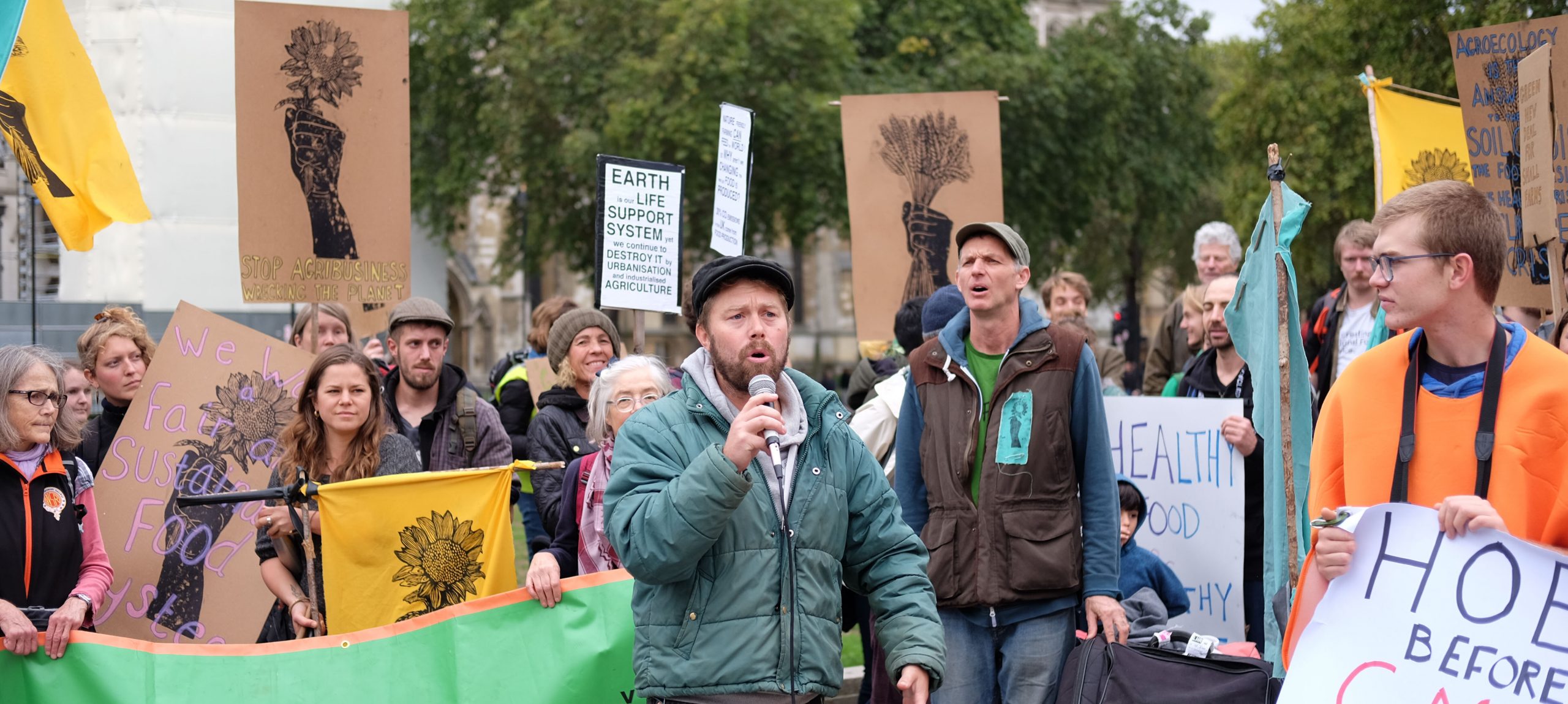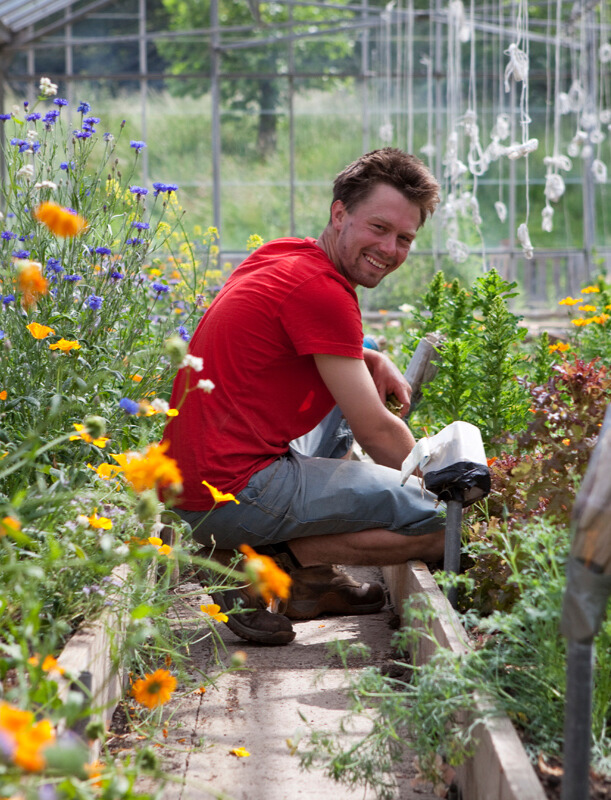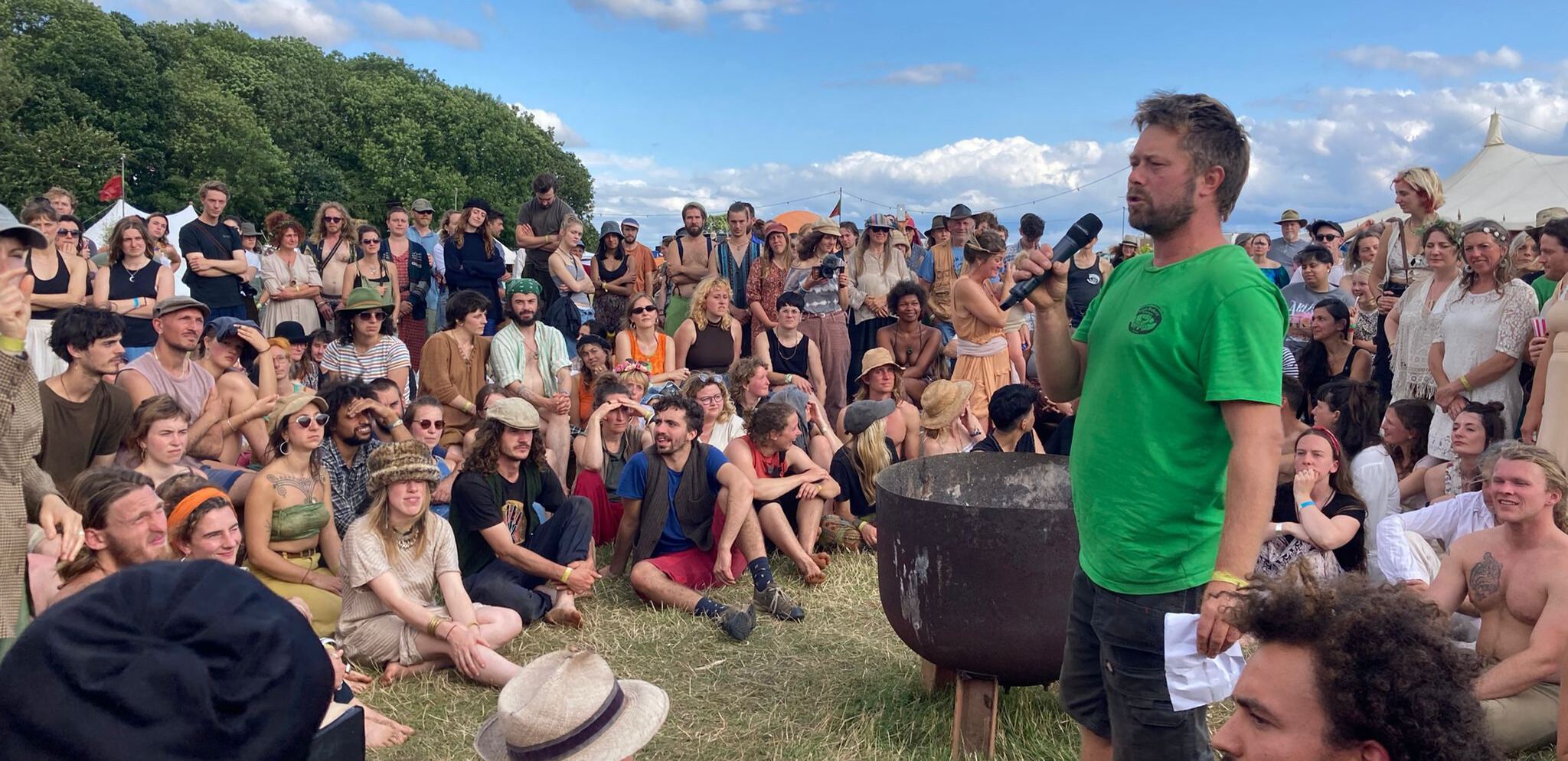Grower and founding member of the Landworkers’ Alliance, Adam Payne, reflects on his journey back to the land and combining farming with activism and social change, in this extract from our new book “With the Land | Reflections on Landwork and Ten Years of the Landworkers’ Alliance“
Many of my strongest childhood memories come from the land and the communities that live from it. Growing up on a smallholding in North Devon in the 90s, me and my friends would work long summer evenings bringing in hay for neighbours. We would sit and listen to stories of how they used to cultivate the fields around us by horse, growing cereals that were baked into bread and sold at the market in town, or fed to the cows, whose milk made cheeses that were aged in the larder on the cold north wall of the old farmhouse. We would pick apples from the orchard grass, and taste the fresh juice flowing from the press. We would watch lambs slipping into life, and be shown what to look for in a good oak.

But while I was growing up in this world, learning its beauty and finding my heart bound to the land, it was being pulled down around me. I was arriving into a world of small farms being systematically destroyed, already many long decades into the erosion of peasant culture and economy. It was not gone; but the sound of tractors on summer evenings was fading, and where there once were many, only a few remained.
The culture I grew up in never presented farming as a serious option for those not born to farming families. Food and farming were victims of globalisation, and we were taught as teenagers that their time was over and our future was to be found somewhere else. In the years that followed, I began to understand the extent of the damage that the destruction of land-based dreams in the minds of young people like me, had done.
“Working with the Landworkers’ Alliance brought engagement with established unions from around the world. They helped me to understand that the state of the community I grew up in was not predetermined; despite the huge challenges, the decline was not inevitable.”
I travelled and spent time in peasant communities around the world. Everywhere, farmers, peasants and landworkers existed in different economic and political environments, in some places vibrant, organised, and hopeful; in others battered, devalued, and repressed. But everywhere, the centrality of cultural survival was understood as the seed from which the future could grow, the embers that must be kept alive.
Returning home and looking for a meaningful way to live and work, I found my way back to the land and started working in market gardening, combining farming with activism and social change. Working with OrganicLea, a workers cooperative running a market garden and box scheme on the edge of London interwoven with inspiring, community-rooted training, volunteering, and outreach; I was a part of the founding of the Landworkers’ Alliance. We had seen the success of the international movement La Via Campesina and were motivated by the potential to build a voice for grassroots farmers, foresters, growers, and Landworkers here in the UK.
Working with the Landworkers’ Alliance brought engagement with established unions from around the world. They helped me to understand that the state of the community I grew up in was not predetermined; despite the huge challenges, the decline was not inevitable.

Spending time with organisers in the French union Confédération Paysanne, I learnt that the enviable position of French landworkers was not an inevitable result of the cultural value placed on food in France; but the hard won achievement of generations of organised peasant farmers who articulated, defended, and advanced their culture and economy in the face of huge obstacles. Deepening the cultural value of food was a strategy to defend the land. Now French landworkers can identify as peasants and evoke a range of values around reliability, quality, locality, care, community, and autonomy; which seem to trace an unbroken link back hundreds of years. But this wasn’t a historical inevitability, they have fought to defend their identity, to maintain and evolve the policies and social understanding that protect and enhance their livelihoods and culture.

“We need to put the refracted and broken pieces together to create power. Our diversity is as essential as our unity; every history and identity has a contribution to make, and without embracing all of them we will not be able to achieve the collective evolution that we all need.”
This can seem an overwhelming path to follow here in the UK, where society is deeply infused with the legacies of enclosure, industrialisation, and colonialism. Many of our ancestors were subjected to a systematic and multi-generational campaign to disconnect people from the land, which created precarious workers for industrial centres and traumatised people who became perpetrators of colonialism. The chain of oppression and suffering caused by this has structured the world we live in today. The results of this enforced disconnection are visible in everything from our education system and food traditions, to our hedgerows and cities.
From this point the path looks long, especially so when the protagonists are farmers, foresters, growers, and landworkers; working long and exhausting days, often isolated and underpaid. But together we can become more than the sum of our parts and see the hope and the power of collective action. Together we see one another and immediately recognise friends and allies, people who know the same world that we do and whose lives share a common thread with ours. Whether we are from the same county or the other side of the world, we have so much shared experience and so much to gain from understanding each other and working together.
But it also goes far beyond land work; we are in a complex web of shared interests with other working people, striving to build economies and social systems that respect the limits of the earth and the rights of all people.
Globalisation of our food and energy systems extracts wealth, nutrients, and carbon; and moves them around the world to points of profit and control. This creates zones of excess and deficiency: extreme wealth and extreme poverty. The decentralised, localised systems at the basis of our vision of food sovereignty circulate finance as they circulate nutrients, carbon, and energy; creating wealth for everyone and ensuring that health and nutrition are the basis of life available to all, and not commodities only for those who can afford them.
We need to put the refracted and broken pieces together to create power. Our diversity is as essential as our unity; every history and identity has a contribution to make, and without embracing all of them we will not be able to achieve the collective evolution that we all need. Our movement has the vision and potential to bring the control of food, energy, and finance back from corporations into the hands of working people, if we can build the strength and unity necessary to take it.
Adam Payne is head grower at Awen Organics, a 25 acre organic farm growing high quality fresh vegetables in North Pembrokeshire, West Wales. He’s a founding member of the Landworkers’ Alliance.
This was an extract from the Landworkers’ Alliance 10th Anniversary book, ‘With the Land – Reflections on Landwork and Ten Years of the Landworkers’ Alliance‘, published with the permission of the author, Adam Payne.



